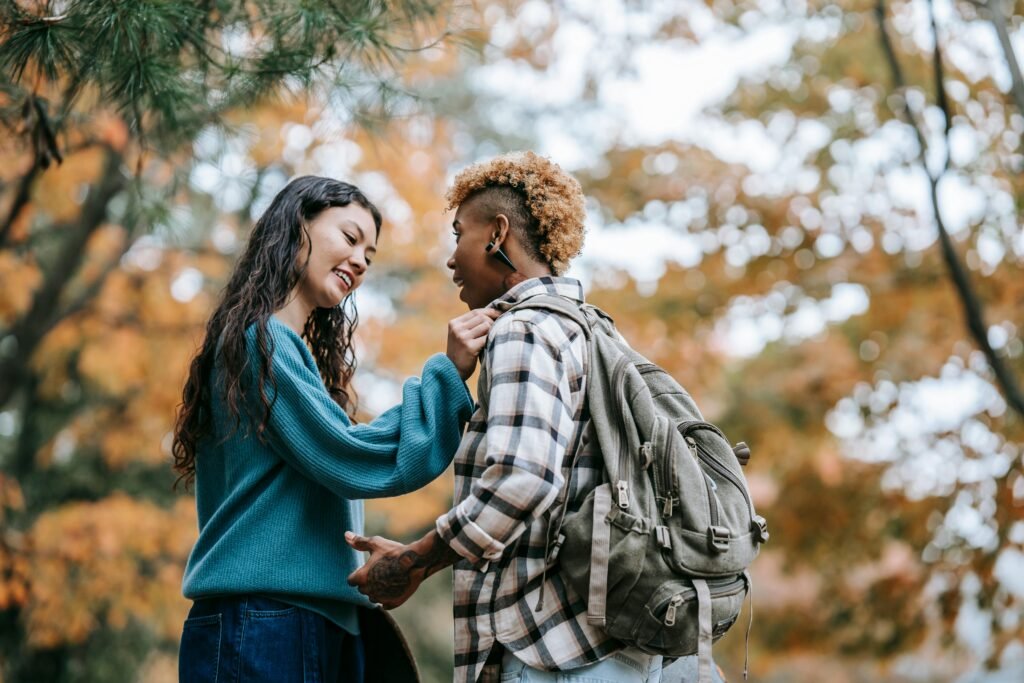
Good communication is the secret sauce of any successful relationship. Open communication in relationships means sharing thoughts, feelings, and information clearly, honestly, and respectfully. “Satisfying relationships are not conflict-free, but they involve the kind of trust that allows couples to argue constructively and to engage in effective problem-solving behaviors.”
Picture this: You’re sitting across from your partner, the air thick with tension after a disagreement. You both want to make things right, but the words seem to escape you. Sound familiar? Communication breakdowns like these are all too common in relationships, yet they hold the key to unlocking deeper connection and understanding. In this article, we delve into the importance of communication in relationships, exploring how open dialogue fosters trust, resolves conflicts, and ultimately strengthens the bond between partners. So, let’s dive in and discover the transformative power of effective communication.
1. Practicing active listening:
Active listening is a communication technique that entails fully concentrating on what the speaker is saying, comprehending the message they’re attempting to convey, and responding with understanding and empathy. Paying attention, avoiding distractions, paraphrasing, clarifying questions, reflecting on emotions, and responding with empathy are all important components.
Practicing active listening involves more than just hearing words; it’s about fully engaging with your partner’s thoughts, feelings, and perspective. Here’s how to be a good listener and what you can do to practice active listening effectively:
Got it! Let’s break down each point and add three bullet points within each:
**Make eye contact:**
- – Establishing eye contact shows respect and attentiveness.
- – It helps to convey genuine interest in the speaker’s words.
- – Eye contact fosters a sense of connection and engagement.
**Listen carefully**
- – Focus on the speaker’s words without getting distracted.
- – Avoid mentally formulating responses while the speaker is talking.
- – Give your full attention to what is being said.
**Refrain from interrupting:**
- Allow the speaker to express themselves fully without interruptions.
- Interrupting can disrupt the flow of conversation and make the speaker feel unheard.
- Practice patience and wait for natural pauses before contributing to the conversation.
By practicing active listening techniques, you can enhance your communication skills and deepen your connection with your partner, fostering trust and understanding in your relationship

2. Paying attention to nonverbal communication:
Deciphering nonverbal cues provides valuable insights into the thoughts and feelings of others. Rather than a means of mind-reading, it serves as an extra dimension for deepening our understanding of one another in relationships, can tell us a lot about how the other person is feeling and thinking. It definitely is not a form of mind-reading; it is rather an additional avenue that we can explore with our partners to enhance our understanding of each other.=
The importance of paying
attention to nonverbal communication involves being attuned to the unspoken cues conveyed through body language, facial expressions, gestures, and tone of voice. Understanding these nonverbal signals enhances communication by providing additional context and insight into the speaker’s thoughts and emotions.
During your conversations with your partner if you can act out the following thins there is a lesser chance of getting messed up and having issues with your relationship.
Sure, let’s simplify it further:
**Observe body language:**
– Notice gestures and posture.
– Look for signs of discomfort.
– Pay attention to eye contact.
**Interpret facial expressions:**
– Identify emotions like happiness or sadness.
– Watch for subtle cues.
– Consider microexpressions.
**Listen to tone of voice:**
– Note changes in pitch and volume.
– Listen for warmth or sharpness.
– Pay attention to emotional cues.

3. Creating a safe space
“‘Communication doesn’t always come easy, whether it’s with a romantic partner or someone else. But it’s key to such partnerships’ overall success and sustainability.” ~forbes
According to us, effective communication involves attentive listening and understanding, rather than simply formulating responses. It’s about validating your partner’s thoughts and emotions and fostering a supportive environment for open dialogue. Asking questions and remaining open-minded are key elements, even in the face of differing opinions. Conversely, poor communication habits may manifest as interruptions, passive-aggressive behavior, or holding onto grudges, hindering resolution. Avoiding direct communication, assuming feelings, or repeating arguments without resolution can also contribute to ineffective communication patterns. Additionally, resorting to name-calling, threats, or raised voices can escalate conflicts rather than resolve them.
Creating a safe space within a relationship is essential for fostering trust, intimacy, and emotional well-being. It involves establishing an environment where both partners feel comfortable expressing themselves and sharing their thoughts and feelings without fear of judgment or reprisal.
**Nnon-judgmental communication:**
– Conversations where both partners feel heard and understood.
– Avoid criticizing or blaming each other.
– Validate each other’s perspectives.
**Respect autonomy:**
– Respect each other’s personal space and boundaries.
– Avoid pressuring your partner into uncomfortable situations.
– Honor each other’s autonomy and independence.
**Cultivate trust and emotional safety:**
– Be reliable and consistent in your words and actions.
– Avoid betraying your partner’s trust by keeping promises
– Create an atmosphere of emotional safety where vulnerability is embraced and nurtured.
4. When We Should Apologize
“It might sound very basic, but apologies are only needed when you have done something wrong. That’s it.” ~brides
Apologizing plays a vital role in maintaining healthy relationships, serving as a mechanism for acknowledging mistakes and expressing remorse. Recognizing the appropriate times to offer apologies and seeking guidance if unsure is essential. Consulting a therapist can provide valuable insights into effective apology strategies and foster communication skills within the relationship. Despite the challenges that may arise, understanding the significance of apologizing can strengthen the bond between partners and cultivate mutual respect and understanding. By openly discussing expectations and preferences with your partner, you can foster a supportive environment where apologies are valued and contribute to the resilience of the relationship.
Understanding when to apologize is crucial for maintaining healthy relationships. It involves recognizing when our words or actions have caused harm or offense to our partner and taking responsibility for our behavior.
**Reflect on the impact of your actions:**
– Consider how your behavior may have affected your partner emotionally or mentally.
– Be honest with yourself about whether your actions were disrespectful or not.
– Recognize that intent does not always negate the impact
**Be attuned to your partner’s feelings:**
– Listen to your partner’s perspective and validate their emotions.
– Pay attention to cues such as sadness, frustration, or withdrawal, which may indicate that an apology is warranted.
– Empathize with your partner’s experience and acknowledge the validity of their feelings, even if you don’t fully understand or agree with them.
**Take ownership of your mistakes:**
– Apologize sincerely and without making excuses or deflecting blame.
– Express remorse for any pain or distress caused by your actions.
– Commit to making amends and changing your behavior to prevent similar incidents in the future.

5. Not to make any assumptions:
Making assumptions is a common mistake during a relationship, especially when you keep guessing stuffs without proper clarification from your partner. The situations can get messed up when u assume the situation one way and things start to go the other way around. The problems are common and although u cann do things to turn the situation in your favour it may be chaotic if it doesn’t work. What leads to toxicity is when people take these assumptions and run with them. They’d rather believe the hearsay, or rather believe their own thoughts than the realities because it validates the emotions that they really “want” to be experiencing.
The more we indulge in assumptions, the greater the risk of damaging all our relationships, not just romantic ones but also those with family, friends, and even ourselves. A healthier approach involves fostering open communication with our partners, where we can openly express our thoughts and feelings without fear of judgment. Additionally, seeking insights from trusted sources, such as our partner’s family or close friends, can provide valuable perspectives and help dispel unfounded assumptions. Plus following the basic communication strategies mentioned below may help:
- Schedule regular check-ins: Set aside dedicated time to discuss your relationship, feelings, and any concerns that may arise. This can help prevent issues from escalating and foster a deeper connection.
- Listen actively: Practice attentive listening when your partner is speaking, allowing them to express themselves fully without interruption or judgment. Show empathy and understanding towards their perspective.
- Express your feelings: Share your thoughts and emotions openly with your partner, even if they may be difficult to articulate. Be honest and transparent about your needs, desires, and concerns.
- Encourage feedback: Create a safe space for both partners to provide feedback and constructive criticism. Use non-confrontational language and focus on finding solutions together rather than placing blame.
In conclusion, effective communication is the cornerstone of a healthy and thriving relationship. By practicing active listening, paying attention to nonverbal cues, and creating a safe space for open dialogue, couples can foster trust, resolve conflicts, and deepen their connection. Knowing when to apologize and avoiding assumptions further contribute to the strength and resilience of the relationship. By implementing these strategies and fostering a culture of open communication, couples can navigate challenges with compassion and understanding, ultimately building a strong and enduring bond. So, let’s commit to cultivating communication skills and fostering meaningful connections in our relationships.
